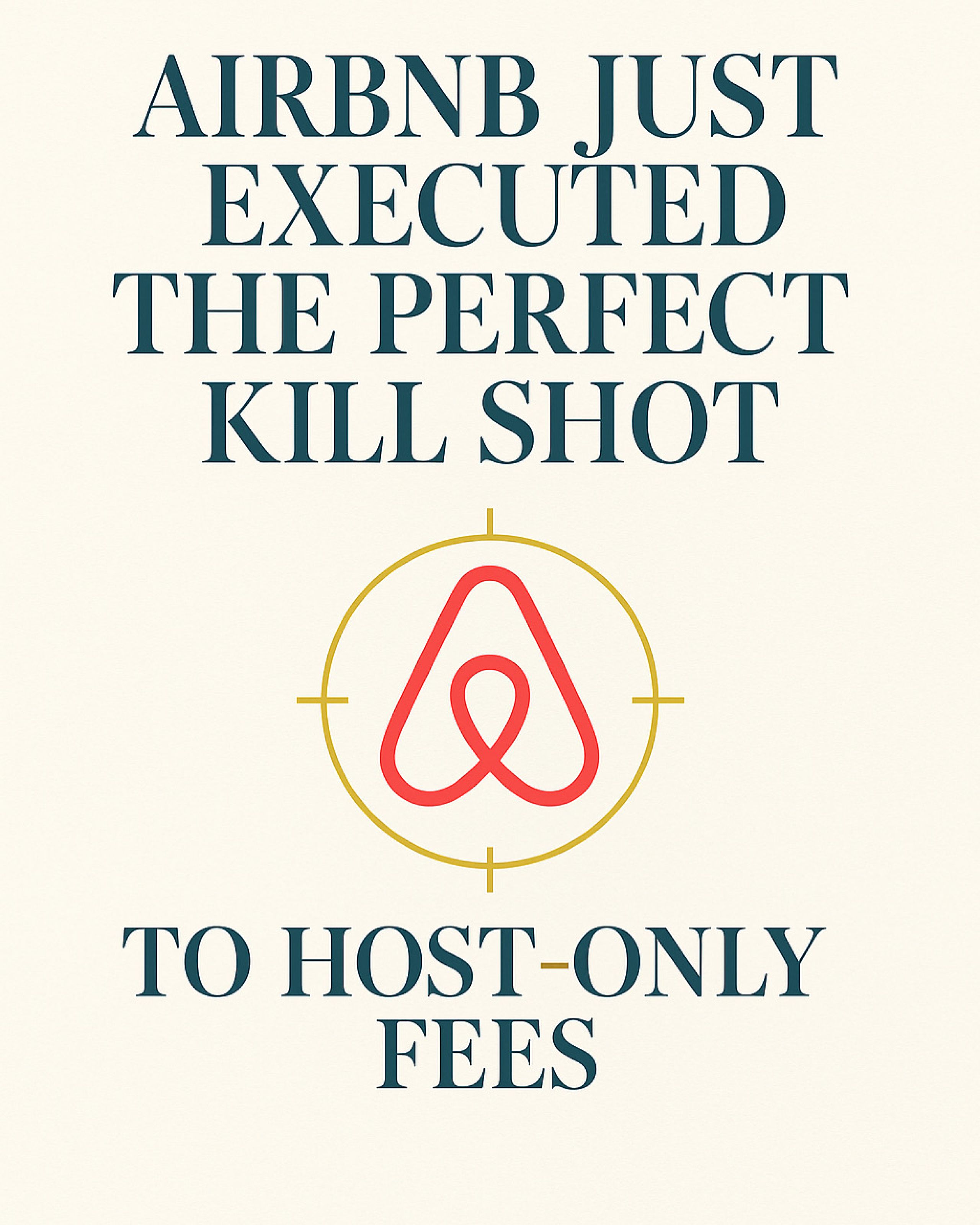
Airbnb’s “Kill Shot” Fee Change: Why it Matters and How Hosts Must Respond
Airbnb has just announced a major change: starting October 27th, all hosts will move to a host-only fee structure of 15.5% (16% in Brazil). On the surface, this looks like a simplification adjustment. However it has shaken the global short-term rental industry as it buzzes with panic, some even calling it “the kill shot.”
Let’s clear the noise.
For professional hosts, nothing has changed. For hobby hosts, this is the wake-up call.
What Has Actually Changed
Before:
- Hosts paid 3% in service fees, while guests paid an additional 14-16% in visible Airbnb fees.
Now:
- Hosts will pay 15.5% (16% Brazil), while guests see zero fees.
Airbnb has aligned itself with hotel pricing models making this change clear on their help center under Simplifying Airbnb Service Fees: one clean price for the guest, with the platform taking its cut behind the scenes. To many hosts this move signals strategic warfare.
Why This Matters
For years, many hosts relied on the sales pitch: “Book direct and save on Airbnb’s fees.” That argument is now gone, and their “competitive advantage” vanished overnight. Guests will no longer see the platform as adding cost, instead they see one clean price, much like the hotel industry.
Airbnb has just flipped the psychology:
• Before: Guests blamed Airbnb for high prices.
• Now: Guests will assume it’s you, the host, who is charging more.
This is not simply a fee shift. It’s a rebalancing of power away from hosts, further into Airbnb’s control.
How We Got Here
Airbnb’s move is not random. It fits a pattern that has been building for years:
• Cutting back guest-host direct communication
• Masking host contact information
• Penalizing off-platform bookings
• Removing incentives for direct booking
Each step reduced host leverage and tightened Airbnb’s control. By adopting a hotel-style pricing model, Airbnb not only makes fees invisible to guests but also removes one of the strongest direct booking pitches.
And it’s worth remembering: regulators have been targeting “junk fees.” Airbnb’s solution is simple, remove them from sight. You cannot regulate what the consumer cannot see.
Impact on Caribbean
Here’s where the Caribbean context is critical.
• Professional hosts, those already operating under Airbnb’s “host-only” model have long been paying around 15%. For us, this is not new. At Brief Homes International, for example, we’ve always factored 15% into our pricing models.
• Caribbean hosts, however, are a different story. Many entered the STR industry casually, paying only 3%, without systems, CRMs, or direct booking strategies. For them, this change is a shock.
This is why so many hobby hosts are panicking. Not because the model is broken, but because they were never structured as professional hosts in the first place.
The truth is, the Caribbean STR market doesn’t have a demand problem. It has an education gap. And this policy shift has just exposed it.
What This Really Means for Host
If you’ve built your business on strategy, systems, and repeat guests, this change is not a death blow. In fact, it can work in your favor. Here’s why:
• Direct bookings remain powerful. Guests still value trust, service, and relationships, not just price. If you’ve built credibility, your direct bookings can still thrive.
• Clean pricing works for everyone. We’ve already been creating “one price” systems at Brief Homes International, and it works. Guests want transparency. Hosts who can articulate their value will win.
• Caribbean hosts must stop treating STR like a hustle. This is a professional industry, globally valued in the billions. Without systems and insight, you will always feel blindsided when platforms like Airbnb make changes.
Practical Steps Hosts Should Take Now
1. Adjust your pricing immediately. Factor the new 15.5% host fee into your rate calculations so margins are protected.
2. Educate your guests. Move beyond “no fees” messaging and focus on “best value, best service, best experience.”
3. Invest in a CRM. At Brief Homes International, we’ve leveraged CRMs to nurture guest relationships, manage repeat stays, and even prioritize guests based on overall spend and loyalty.
4. Diversify your booking pipelines. Airbnb is not the only option. Direct booking websites, niche OTAs, and repeat guest strategies are essential for long-term stability.
5. Prioritize systems over survival. Hustle culture may get you quick wins, but without systems and education, you will always be vulnerable to the next platform policy shift.
What’s Next
Let’s be clear: Airbnb’s move to 15.5% is not the end. It’s the beginning. Hotels regularly pay 18–22% in OTA commissions. Airbnb has room to raise fees further while still claiming they are “industry standard.”
The next logical phase could include brand-neutral listings, where your property name disappears into “Apartment in Port of Spain.” Your brand identity erased.
If you don’t build your brand now, Airbnb will happily erase it for you.
Final Thoughts
This change is not a “kill shot” against direct bookings. It is a kill shot against uneducated, unprepared hosts who have depended solely on Airbnb.
The hosts who will survive and thrive are those who understand this industry as professional, who invest in systems, and who build credibility with guests beyond a single platform.
The Caribbean STR market must take this as a wake-up call. If you continue to operate from hustle and survival, you will always be at risk. If you step into education, systems, and global strategy, you can position for growth, resilience, and long-term profitability.